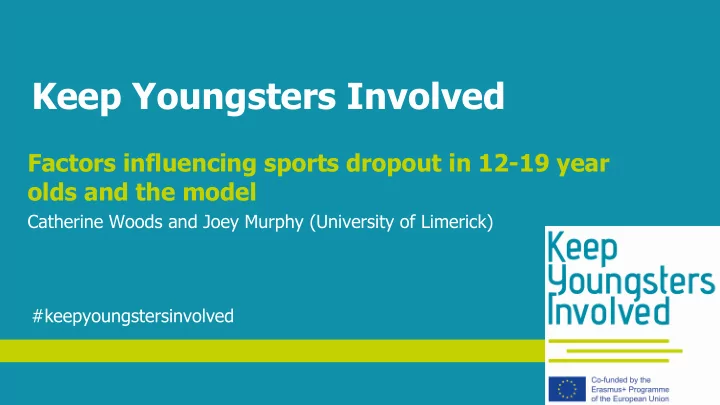

Keep Youngsters Involved Factors influencing sports dropout in 12-19 year olds and the model Catherine Woods and Joey Murphy (University of Limerick) #keepyoungstersinvolved
Work Package 1 (WP1) Aims Goals • To collect research information about • Identify factors influencing youth determinants/correlates (i.e. factors) of sports dropout. sports dropout for youngsters. • To collect knowledge of motivation, • Develop a framework to understand behaviour change methods and effective these factors. approaches. • To audit examples of practical tools from • Create good practice statement linking grass-root sport organisations. the factors to strategies used by grass-root sport organisations
Methods 1. Rapid review of the published literature. 2. Grey Literature was identified in the partner countries and used to support or add to the published literature findings.
Rapid Review Process 1. Balish, S.M., McLaren, C., Rainham, D., & Blanchard, C. (2014) Correlates of youth sport attrition: A review and future directions. Psychology of Sport and Exercise, 15(4), 429-439. 2. Crane, J., & Temple, V. (2015). A systematic review of dropout from organised sport among children and youth. European physical education review. 21(1), 114-131. 3. Temple, V., & Crane, J. (2016). A systematic review of dropout from organised soccer among children and adolescents. Soccer and Society. 17(6), 856-881.
Published Literature Findings • Definition for sports dropout: “the prolonged absence of systematic practice and competition, either in one sport (sport-specific drop out) or all sports (sport-general dropout)” (Adapted from Balish et al. 2014) f 14 39 fa 144 factors 14 factors 39 factors factors ctors Identified Significant Preventing Dropout
Published Literature Findings Intrapersonal Institutional/Organisationa l • Extrinsic Motivation • Climate Provided • Autonomy • Perceived Competence Interpersonal • Relatedness • Coach Relationship • Attitude • Peer Involvement • Intention to Participate • Parental Autonomy • Values Support • Intrinsic Motivation • Enjoyment Social Ecological Model of Sports Dropout (Balish et al. 2014)
Grey Literature Findings 10 pieces of grey literature (e.g. national reports, PhD thesis) were identified from 5 partner countries. Biological/Personal Institutional/Organisational • Gender • Accessibility • Age • Type of Sport • Injury • Cost • Years of Participation Intrapersonal • Goal Conflict • Self-Efficacy Social Ecological Model of Sports Dropout (Balish et al. 2014)
KYI Framework Enable youngsters to participate in sport. These can include: Biological enablers Factors internal to the sports club Interpersonal factors in the Factors external to the sports club social environment (i.e. parents, peers, coaches etc.) Intrapersonal factors that increase the likelihood of the outcome behaviour Describe the person or population These are broken into two fundamental (e.g. age, gender, occupation etc.) questions: Am I able (e.g. motivation, perceived competence etc.) Framework for preventing youth sport dropout. Adapted from the Is it worth it (e.g. enjoyment, values Youth Physical Activity Participation Model (Welk, 1999) etc.)
Factors in the framework • Intrinsic Motivation • Gender • Autonomy • Age • Perceived Competence • Years of Participation • Intention to Participate • Self Efficacy • Extrinsic Motivation • Relatedness • Values • Enjoyment • Expectancies • Attitude
Grey Literature Findings • Coach Relationship • Climate • Peer Involvement in Sport • Type of Sport • Parent Autonomy Support • Cost • Accessibility • Time/Goal Conflict • Injury
Strategies that influence: Hope to: • Autonomy Increase • Perceived Competence/Self Efficacy • Intrinsic Motivation • Relatedness • Enjoyment • Climate (Task) • Social Support • Time/Goal Conflict • Environmental Support • Cost • Positive Goal Orientation • Expectancies • Positive Attitude • Values • Coach-Athlete Relationship • Peer Involvement in Sport • Parental Autonomy Support • Accessibility • Type of Sport • Prevention Policy
Recommend
More recommend